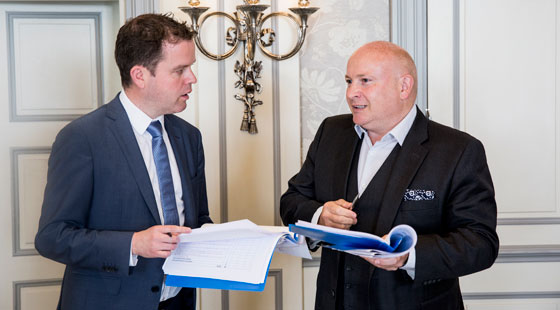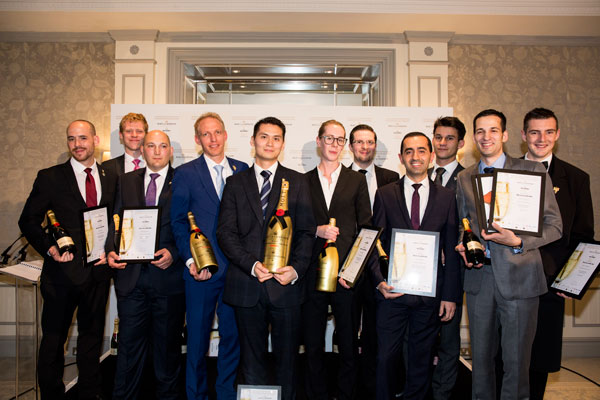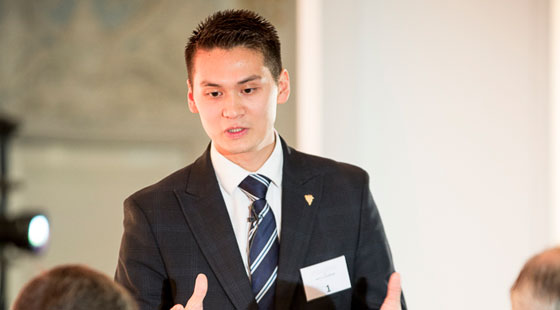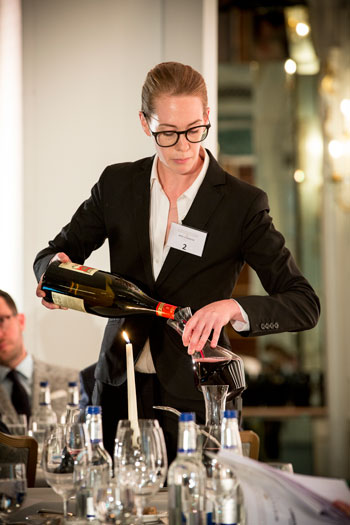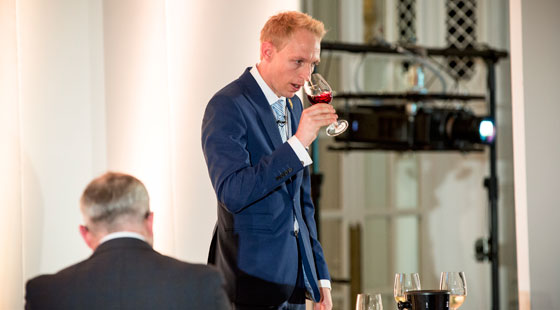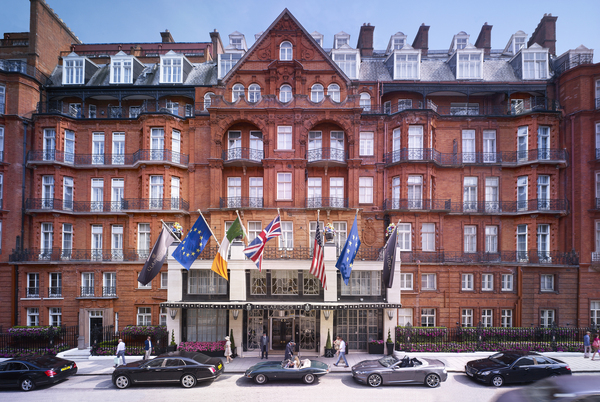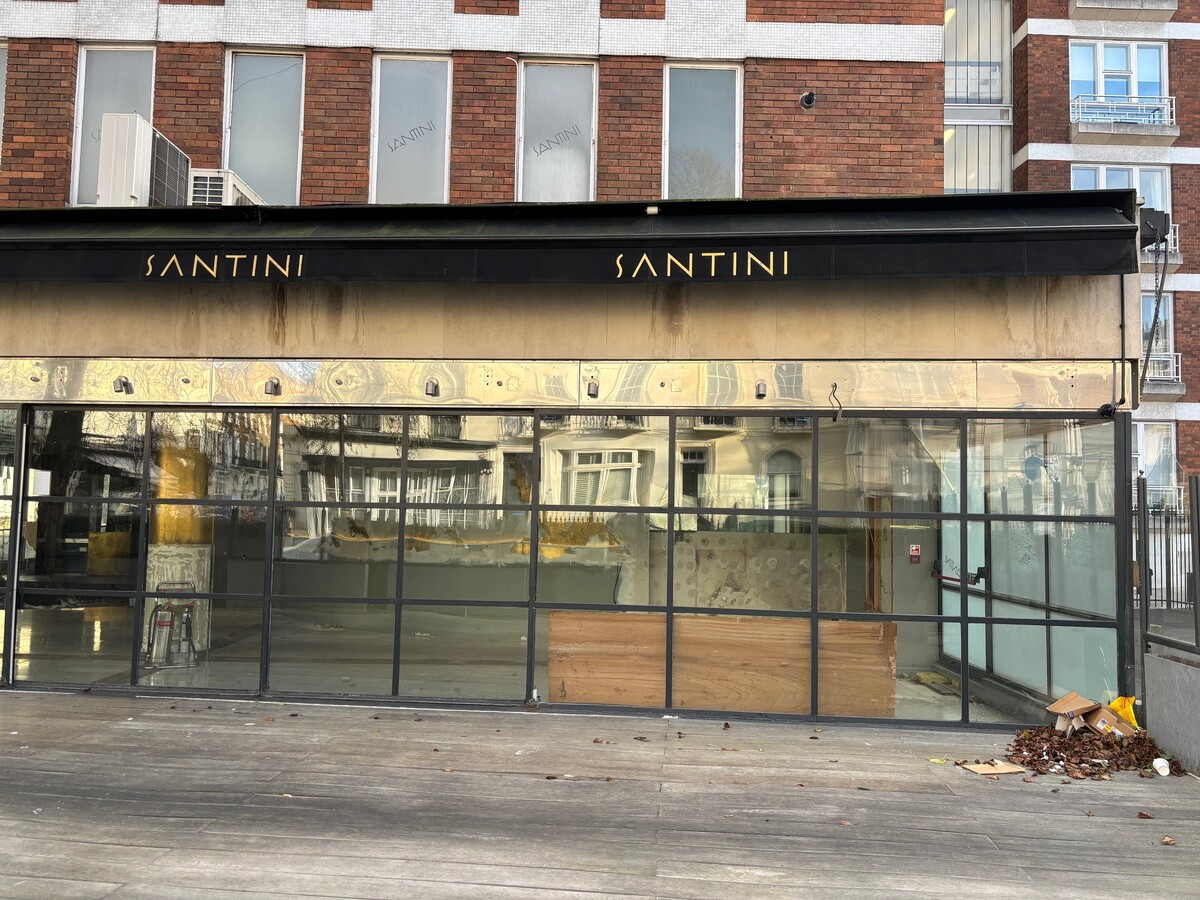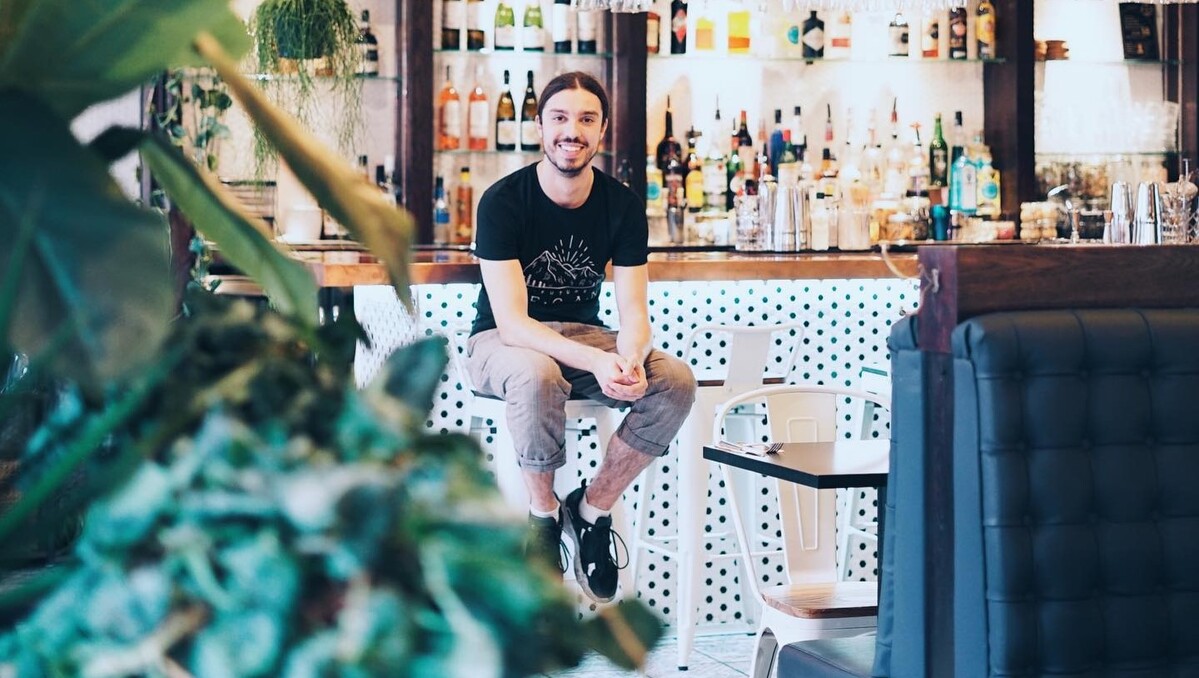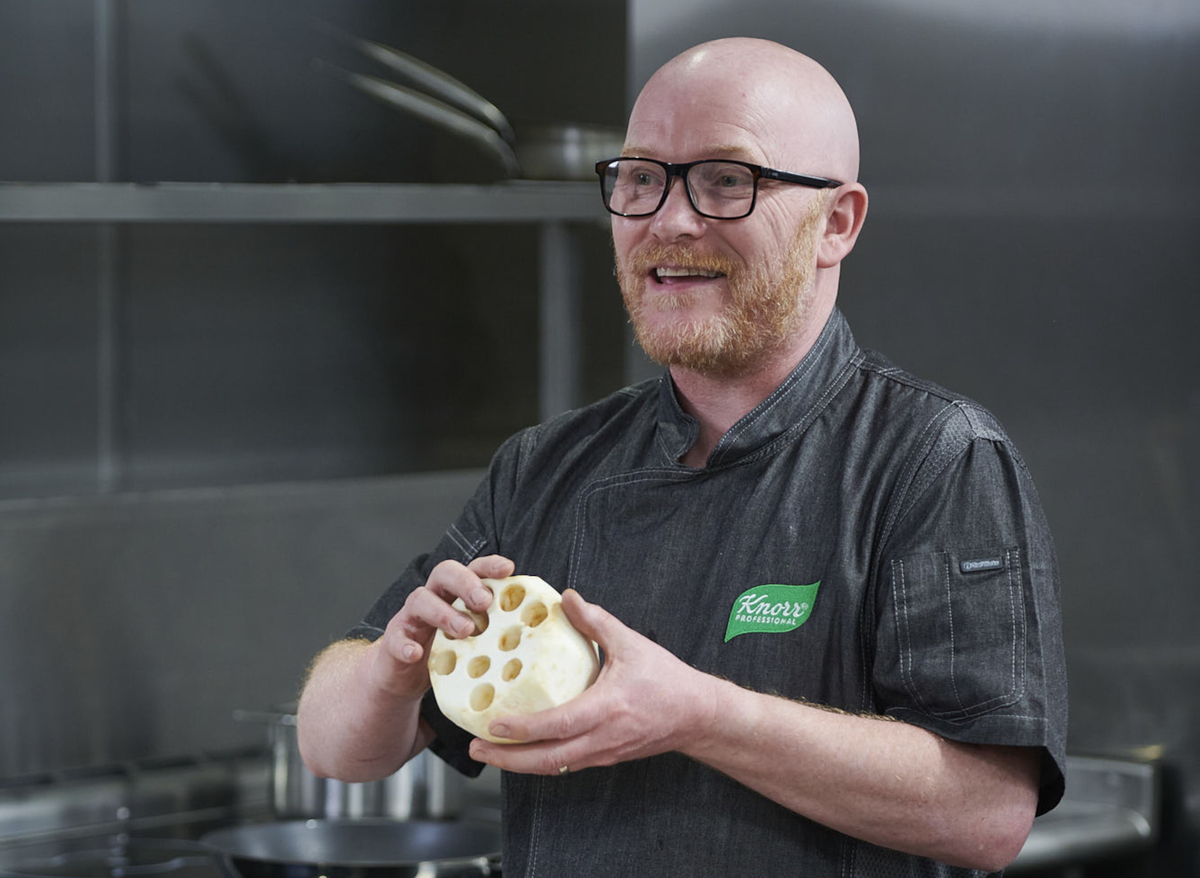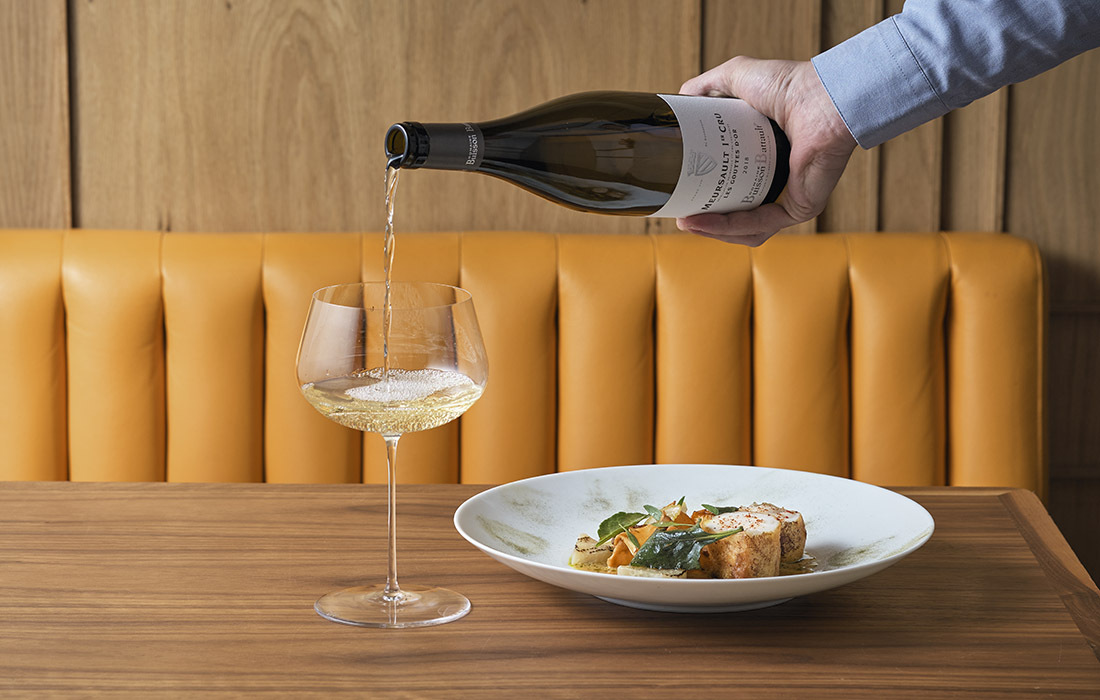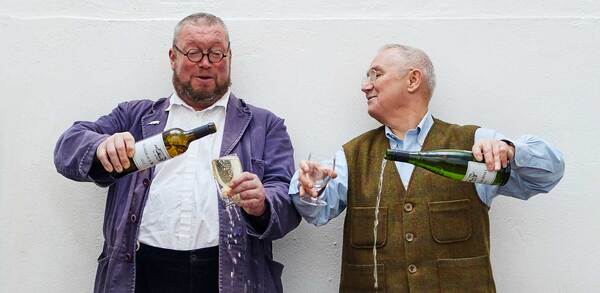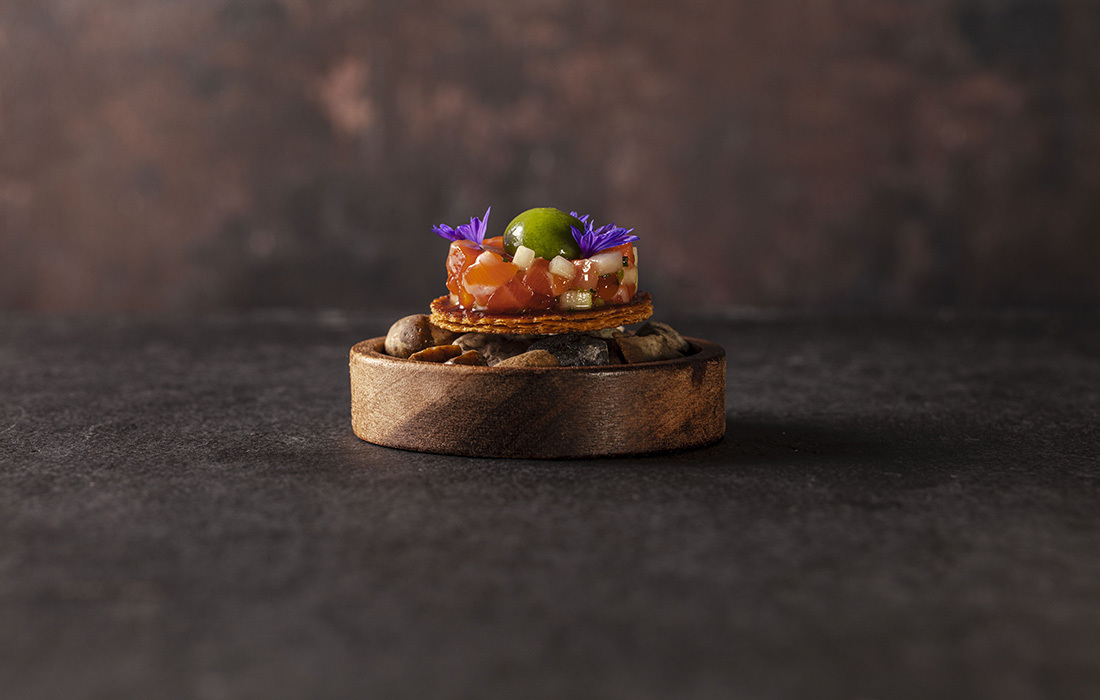Moët & Chandon UK Sommelier of the Year 2017
In front of hundreds of hospitality experts in the audience and the grand names on the judging panel, the dozen sommeliers who reached the finals of the UK Sommelier of the Year were whittled down, round by round, to a final-three face-off. Fiona Sims was there
A hush descends as the live final of the Moët & Chandon UK Sommelier of the Year at the Savoy in London gets under way. The 250-strong audience, made up mainly of hospitality industry professionals, scan the first question facing the finalist on the screen in front of them. The task? To spot errors on the wine list.
Subsequent tasks will include giving a full organoleptic description of a wine for three minutes (which is a long time up there on stage), identifying the grape variety, country, region and vintage of three different wines, and identifying four different kinds of higher alcohol booze in blacked-out tasting glasses.
And thatâs just the first half. Itâs gruelling stuff. The UK Sommelier of the Year is the Ironman of wine competitions. Itâs now 3pm and theyâve been at it for nearly seven hours. The day started with 12 quarter-finalists, who were then whittled down to six semi-finalists, and now there are just three left.
The three are Melbourne-born Julia Sewell, who is junior assistant head sommelier at the Fat Duck in Bray, Berkshire, along with Mathias Camilleri from Paris, who is head sommelier at the Five Fields Restaurant in London, plus Gareth Ferreira, who hails from South Africa and was until recently assistant head sommelier at 67 Pall Mall but is about to start as sommelier at Clare Smythâs much anticipated new opening, Core, in Notting Hill.
Now in its 37th year, the UK Sommelier of the Year, run by the Academy of Food & Wine Service, and now owned by The Caterer, is the worldâs toughest wine competition. The aim? To find the sommelier with the best booze knowledge and the most outstanding technical skills. The winner gets entry to the European
Sommelier of the Year competition, and ultimately, the Worldâs Best Sommelier â" the planetary peak for your ambitious sommelier.
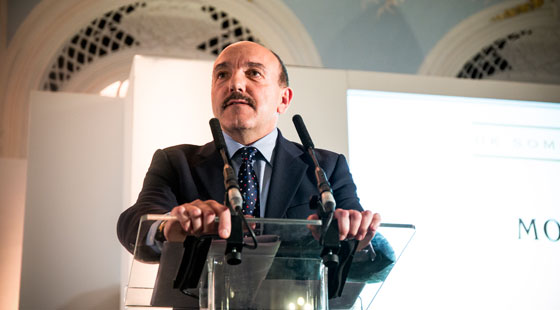
After scoring at least 75% on a questionnaire, the competitors went through to the regional finals, where they had to complete a written paper, a blind tasting, and exercises in decanting and food and wine pairing.
From the regionals, 12 competitors were then chosen to compete in the quarter- finals, on the day of the live final, which involved completing a series of tricky tasks set by head judge Gerard Basset. They included another blind tasting, a questionnaire, a series of snappy questions and a service skills test. Six were eliminated based on the results of these tasks, and after another round of testing and tasting, three finalists were announced in front of an audience for the live final.
âIs there a winning formula for the competition? Itâs a combination of things, but at the top of that list have to be plenty of competition experience and ice-cool nerves.â
Judges include some of the best sommeliers in the business, many of them past winners. They scrutinise the contestants under the watchful eye of Basset, who has more letters after his name than anyone else in the industry â" something the master of ceremonies, Pride of Britain Hotels chief executive Peter Hancock, canât resist sending up as he launches the event.
Thereâs one last task to be completed to finish off the first half of the final â" identifying four different liquids â" or âleek-queedsâ, as Basset puts it to each competitor. âTo do a blind tasting in front of an audience is terrifying. Even doing it in front of your wife is terrifying!â he quips to the crowd.
When youâre given the correct answers at the end of the task, it all seems straightforward enough: gin, Aperol, bourbon and cognac XO. But when youâre up on that stage, with an exhausted palate, itâs a entirely different matter â" wrong answers from the competitors varied from Highland malt (for the bourbon) to Bénédictine (for the gin).
Then itâs time for a short break while the judges work together to set up the next task for the final three: two tables of âdinersâ in a restaurant set each competitor the same series of tasks to carry out, from decanting wine to food and wine matching. And in an added surprise twist for the competitors, they will have to open a magnum of Châteauneuf-du-Pape, which the diners have brought with them to serve with the meal.
You really feel for the competitors here, as they try to raise a smile from the diners (played by the judges) by asking friendly questions while going about their tasks. Ferreira rather boldly plays it for laughs after asking whether they were celebrating tonight. âNo?â he says, when heâs met with blank stares. âWell, it
looks like business to me.â But itâs not happening. Not because the judges want to be mean, but because they need to be fair, explains Basset afterwards.
âThe biggest headache is making sure itâs all kept very fair. During the restaurant scenario the judges might seem deadpan and robotic, but we canât engage in any banter with the competitors when they try to communicate with us â" it wouldnât be fair to the others,â he says.
His fellow diner for the evening, Kathrine Larsen â" not only one of the very few women to have reached the final, but also to have won it in 2014 â" throws another googly by interrupting each of the finalists with a question about Australian GSM. You may not be familiar with the GSM wine category, but the time-honoured southern Rhône blend of Grenache, Syrah and Mourvèdre is a spiritual beacon for Aussie producers of that style. Each sommelier gives a succinct explanation.
âItâs tough when you throw in an unexpected question â" it puts them off their game, and theyâre already nervous. Thatâs the most difficult bit I think,â Larsen confides later.
Youâd think that the quiz that follows would be a bit of light relief. Finalists have to identify the producer behind a label, or iconic winery, or bit of winemaking kit in less than 15 seconds. It doesnât quite work out that way, as the smiling faces of winemaking dynasties are met with blank looks (ours included).
Thankfully, all recognised the glossy chestnut locks of Benoît Gouez, head winemaker at competition sponsor Moët & Chandon. At last we come to the competitionâs grand finale, the magnum pour. This is always a crowd-pleaser: the glasses lined up with precision on a dramatically lit stage, the three competitors standing to attention behind them. The finalists have just six minutes to pour equal amounts of Champagne â" Moët, of course â" into 20 glasses. âYou canât return to any glass, or leave any Champagne in the bottle,â warns Basset.
As the clock ticks the six minutes away, the audience urges the three finalists on. Sewell looks like she will finish short â" and she does, rather frustratingly, by one glass, while Camilleri and Ferreira finish just in time, and there is a collective sigh of relief. I bet Basset is relieved itâs all over now, too?
âActually, no, I love it,â he says. âWe need competitions like this. I enjoy doing it every year. Any profession needs to inspire people to join them. For the kitchen you have Michelin stars and the Worldâs Best 50 Restaurants. For sommeliers you have this. It puts the profession in the spotlight and brings up the level.â
Itâs time to announce the winner. But first, a word from the outgoing UK Sommelier of the Year, Terry Kandylis, at 67 Pall Mall, who confessed before he took to the stage that he hadnât been able to sleep the night before because he had been so excited. âIâm not even competing, yet the adrenaline was pumping!â
He tells the crowd: âItâs been a great year and I donât want it to end,â before finishing all the same with a quote from Aristotle, which must be a first for the competition: âWe are what we repeatedly do. Excellence, then, is not an act but a habit.â
Basset announces the winner first, and Camilleri steps on to the stage to accept his prize and make a speech. âI arrived from Paris five years ago, intending to stay in the UK for a year. But I found a family of sommeliers here who are so warm and encouraging. I love being a sommelier, I love learning about wine. Iâm very emotional at the moment.â Bless.
Serdar Balkaya, head sommelier, Royal Automobile Club, London
Romain Bourger, head sommelier, the Vineyard, Stockcross, Berkshire
Mathias Camilleri, head sommelier, the Five Fields, Chelsea, London
Tamás Czinki, head sommelier, Northcote, Langho, Lancashire
Pierre-Marie Faure, head sommelier, the Lanesborough, London
Gareth Ferreira, head sommelier, Core by Clare Smyth, London
Olivier Frayssinet, assistant head sommelier, La Trompette, London
Alexandre Freguin, head sommelier, Moor Hall, Aughton, Lancashire
Corin Ireland, assistant sommelier, Restaurant Sat Bains, Nottingham
Rudy Le Metayer, sommelier, Summer Lodge, Evershot, Dorset
Chris Parker, assistant head sommelier, Lime Wood, Hampshire
Julia Sewell, junior assistant head sommelier, the Fat Duck, Bray, Berkshire
Meet Mathias Camilleri, the Moët & Chandon UK Sommelier of the Year 2017
It was a German Riesling that got 29-year-old Frenchman Mathias Camilleri hooked on wine â" in Macau, China, of all places. This yearâs winner of the Moët & Chandon UK Sommelier of the Year competition is talking about his wine epiphany. He was 19 years old, dreaming of becoming a jazz musician, and had gone to Macau for a work opportunity.
It was while he was there, missing French culture, he began to hang out with his fellow countrymen working in French restaurants, which is where he got his first proper introduction to wine. He hadnât been a wine drinker until then, finding many wines too tannic and bitter for his palate. But one sip of the Egon Müller Scharzhofberger Riesling Spätlese and he was seduced.
âI thought, âthis is gorgeousâ,â he recalls. âI didnât realise wine could be that good.â And so, on the otherside of the Pearl River delta from Hong Kong, his vinous journey began.
With no easing up of the economic crisis (it was 2009), Camilleri returned home to Paris and enrolled in catering college. As the academic year had already started, he bided his time working as a commis waiter in a restaurantâ" albeit one in the Taillevent stable (now Les 110 de Taillevent), making sure to buddy up with the restaurantâs sommelier.
After a year at catering college, he enrolled in the Albert de Mun sommelier school in Paris. For part of the course he was an intern, first at three- Michelin-starred Pierre Gagnaire, and then in the wine shop back at Taillevent. âItâs in the heart of Paris, where people are very picky and very knowledgeable â" it was great training,â he says.
But he wanted more. He didnât just want access to a greater variety of wines, but also a way to brush up on his English. Cue a new job as commis sommelier at the Vineyard in Stockcross, Berkshire, which offers one of the best lists in the country.
âI thought Iâd spend a year or two there, build up my confidence and my wine knowledge, and then head back to Paris, but I met such nice people and the UK is such a great platform for sommeliers who want to learn, and the customers are so curious and want to share their passion with you, so who would want to leave that behind?â says Camilleri, who is now studying for his Master Sommelier exams.
Since February 2016, Camilleri has been head sommelier at the Five Fields Restaurant, a one-Michelin-star, 15-seat restaurant in Londonâs Chelsea, where he looks after an 800-bin list that skips the globe.
Any hot tips? âTake another look at Australia â" the style of wine is really changing here. These days itâs not about big wines lacking finesse. Instead they are making the terroir talk a bit more,â he declares.
Itâll be five years this August since Camilleri left Paris and he has no intention of returning any time soon. âIâm where I want to be as a sommelier,â he says. âThis is my home now.â
âHe was more polishedâ: why Camilleri got the judgesâ votes
Jan Konetzki (2012 winner)
âIt was a very tight final, with three very different personalities, which isnât something we see every year. But because they had three very different styles, we needed to look even more closely at their technical skills and what they bring to the table. Ultimately you have to ask, do you want this person to look after you at the table? And Mathias was a worthy first choice.â
Tanguy Martin (2015 winner)
âMathias was very confident in what he was doing â" and that was the clincher. His experience in previous competitions has obviously paid off. It also helped that he is currently doing his Master Sommelier exams, so he is well versed. Plus, he was extremely good with the âcustomersâ.â
Gerard Basset, head judge (1989 and 1992 winner)
âThe level was very good this year. Second and third place [Gareth Ferreira and Julia Sewell, respectively] was very close, but first place needed no discussion. Mathias controlled the stage. He was good with all the tasks.â
Gearoid Devaney (2008 winner)
âHe worked hard â" he deserved that win. Heâs a good sommelier â" the most consistent across all tasks, and always working at a high level.â
Terry Kandylis (2016 winner)
âThough we had three candidates this year who had never reached the final before, I felt there was more experience in the room than ever before. They had all competed before, so itâs not surprising that it was pretty close. But ultimately itâs about the finer details, and Mathias was just more polished.â
Eric Zwiebel (2004 winner)
âThe level this year was excellent, but Mathias was just more consistent than most. Itâs such a long day. To keep focused for that length of time requires such strength, and Mathias has that. He deserved to win.â
âCompeting teaches you how to hold your nerveâ
âIâve never got as far as the finals of this competition before. In fact, I didnât even get as far as the regionals last year. But Iâve studied really hard this past year to pass my sommelier exams, so I guess that has paid off. I come from Melbourne and I decided to come to the UK to be closer to European vineyards, where wine is historically entrenched â" though you know how travelling to Europe is a rite of passage for us Aussies.
âMost challenging part of the final? Iâd say the waiting around between each bit. Itâs nerveracking. And even though I know it shouldnât be, as itâs just a few slides that need to be identified, I found the quiz most difficult â" I didnât know any of the people. Iâll just have to remedy that in future.â
Gareth Ferreira, sommelier at Core by Clare Smyth in Notting Hill, London:
âIâm from South Africa. Until very recently I was working at 67 Pall Mall with Terry Kandylis, Ronan Sayburn and the team. Itâs not the first time I have entered this competition. I tried back in 2015 but I didnât qualify for the regionals. Since then Terry and Ronan have been keeping me on my toes. The most challenging bit for me is keeping your nerve. Getting up on that stage in front of 300 or more people is quite something. The more nervous you are, the more you forget â" even simple things, like wiping the bottle after you have poured a glass, though itâs
comforting to know that the judges have all been through it too.
âWhy put myself through it? The rewards are so great. The preparation for this competition alone helps so much with your general growth. But, at the very least, competing teaches you how to hold your nerve.â
âThis is my fourth attempt at winning this competition â" I was in the final 12 last year. Every year Iâve come back stronger. I think you need the experience and the maturity to win this. âWithout a doubt the most challenging part is the stress.
To give it your best shot in such a short time is extremely difficult. And then you have the pressure of the audience and their sharp eyes. Combine that with the judges looking on and you feel naked â" and no one wants to feel naked in
front of a crowd of people, right?
âHardest task? None was harder than the others, but everything feels difficult when you are under pressure. âThe best way to prepare for this? Be ready for anything. âAs a sommelier itâs important to enter â" mainly because you learn a lot about yourself. It updates your knowledge and adds confidence, and gives you a huge amount of credit if you win â" not just for yourself, but also for your team and for your guests.â
The judges
Gerard Basset (head judge) 1989 and 1992 winner, 2010 Best Sommelier in the World, owner of Hotel TerraVina
Bryan Dawes 1983 winner, Court of Master Sommeliers board member
Christopher Delalonde 2010 winner, wine director of Bleeding Heart Group
Gearoid Devaney 2008 winner, director of Flint Wines and co-owner of Cabotte Restaurant
James Handford Owner of Handford Wines Alan Holmes 1999 winner, F&B consultant for HH Hospitality
Roger Jones Owner of the Harrow at Little Bedwyn
Terry Kandylis 2016 winner, head sommelier at 67 Pall Mall
Jan Konetzki 2012 winner, director of wine and Chateau Latour & Artemis Domaines ambassador at Four Seasons Hotel, London
Kathrine Larsen 2014 winner, premium wine ambassador at Enotria
Tanguy Martin 2015 winner, head sommelier at La Trompette
Dimitri Mesnard International brand ambassador at Jackson Family Wines
Xavier Rousset 2002 winner, owner of Blandford Comptoir and co-owner of Cabotte
Ronan Sayburn 1998 winner, head of wines at 67 Pall Mall
Claire Thevenot 2006 winner, on-trade sales director UK at Wine Source Group
Matt Wilkin 2005 winner, director at H2Vin
Nigel Wilkinson Fine-dining account manager at Boutinot Technical group
Nicolas Clerc 2007 winner, account manager at Fields, Morris & Verdin
Matthieu Longuere 2000 winner, London wine development manager at Le Cordon Bleu
Laura Rhys 2009 winner, prestige development manager at Gusbourne Estate
Clement Robert 2013 winner, group head sommelier at 28°-50° Wine Workshop & Kitchen
Eric Zwiebel 2004 winner, head sommelier at Summer Lodge
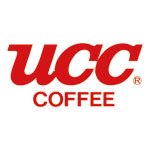
You thought the term âgrand cruâ was reserved just for wine? Think again. UCC Coffee UK & Ireland is on a mission: it wants to deliver the best possible coffee experience for the hospitality industry. If a restaurant serves better coffee, then it will boost profits, so the company has turned to the wine industry for inspiration.
Cue its Grand Crü composition No 2. Itâs a blend of the very best coffee available, with each green coffee achieving a quality score of more than 80, according to the Specialty Coffee Association of America (SCAA).
âItâs a standard thing to do in many winemaking regions â" itâs just the same with coffee,â explains Gayan Munaweera, the companyâs head of coffee quality and Q grader, who has worked with master sommelier Ronan Sayburn to create the blend, which includes Ethiopian Wenago and Sumatran Mandheling Tingkem.
And who can blame UCC for wanting to show it off? As one of the sponsors of this yearâs Moët & Chandon UK Sommelier of the Year 2017, the company answered both competitorsâ and competition attendeesâ caffeine needs with its Grand Crü coffee during the intense one-day event, held at the Savoy in London on 17 July.
ucc-coffee.co.uk



